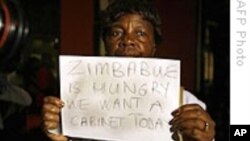Growing instability and social problems in Zimbabwe continue to have an especially detrimental impact on women, despite outward signs of economic and political modification. That’s the message of national leader and co-founder of the grassroots movement Women of Zimbabwe Arise (WOZA), Magodonga Mahlangu.
“The women are facing the brand of suffering. They are directly facing the challenges of trying to put food on the table for their children and also getting medication for their children. So the crisis directly affects the political crisis. The economic crisis directly affects the ordinary citizen with somehow trying to see how they can survive,” she said during an interview this week in Washington.
Arrested more than 30 times, Ms. Mahlangu was jailed earlier this year along with her WOZA co-founder Jenni Williams for leading a peaceful demonstration in October, 2008, demanding the Mugabe government provide food for all, including Zimbabweans hard hit by a nationwide economic meltdown. Finding their legal case increasingly sensitive politically, a Bulawayo Magistrate’s Court released the two rights activists on bail after they spent three weeks in prison. One month ago, their case was postponed again, and the WOZA leaders were remanded out of custody until their trial resumes on December 7.
They arrived in the United States this month to receive the 2009 Robert F. Kennedy Human Rights Award for their efforts to mobilize Zimbabweans to take nonviolent action against injustice. Ms. Mahlangu says that while her court case remains in limbo, she has been able to travel to Washington to accept her award and explain to Americans how little has changed.
“After the Global (Political) Agreement (GPA), people have thought there was a change because there is food in the market. People think that things are OK. But we are really setting the record straight, and also we are very grateful for this opportunity to be here, winning, receiving this award because it is going to amplify the voices of ordinary persons in Zimbabwe,” she explained.
Formed in 2002, WOZA has led more than 100 peaceful protests in support of women’s empowerment. Among the most urgent human rights issues facing Zimbabwean women are domestic violence and rape, the right to food, medicine and education for children, and the right form groups and speak out on important issues. Ms. Mahlangu says her group’s membership is drawing large numbers of supporters.
“We have a membership of about 75,000, a majority of which are women. And also men. And we have about 10,000 members who have been arrested and have come through the courts. And also some of our members were arrested in June for demonstrating about education. They are also facing trial in Zimbabwe,” she noted.
As a human rights defender, Ms. Mahlangu contends that the impressions of change due to last year’s appointment of a power-sharing government give outsiders an inaccurate sense of Zimbabwe citizens’ deepening social and economic woes.
“For an ordinary citizen, we cannot access any money. Nothing has changed. The poverty continues. Their children are not going to school and the health system still remains out of the range of our ordinary citizens,” she says.
Ms. Mahlangu cites a reluctance by several of Zimbabwe’s African neighbors to intensify their commitment to push for greater political and economic reforms. She adds, however, that the most effective way for the international community to show its concern is by focusing on the needs of the people, rather than on attacking the political power issues and giving greater attention to struggles over the Global Political Agreement.
She says the greatest avenues for securing advancement for women in Zimbabwe will be achieved if the country can succeed in drawing up a new constitution.
“If we are given the opportunity to write a people-driven constitution in a way that we know there will be a bill of rights for women and for every citizen of Zimbabwe, then we can have a law of the land that will hold the government accountable and any leader who comes into power will follow that constitution. Then we will be hopeful of a better Zimbabwe,” says Ms. Mahlangu.
The Robert F. Kennedy Human Rights Award has honored human rights defenders from around the world since 1984 with cash prizes of $30,000 and ongoing legal advocacy and technical support from the Washington, D.C.-based Robert F. Kennedy Center for Justice and Human Rights.






